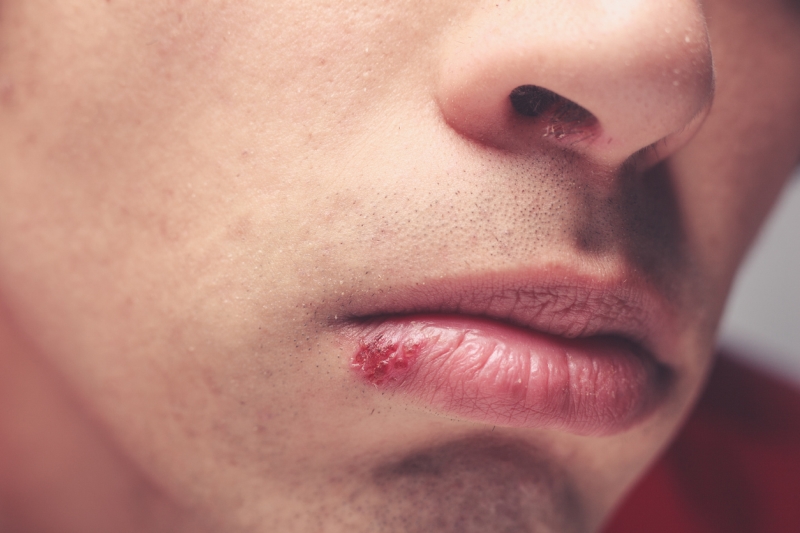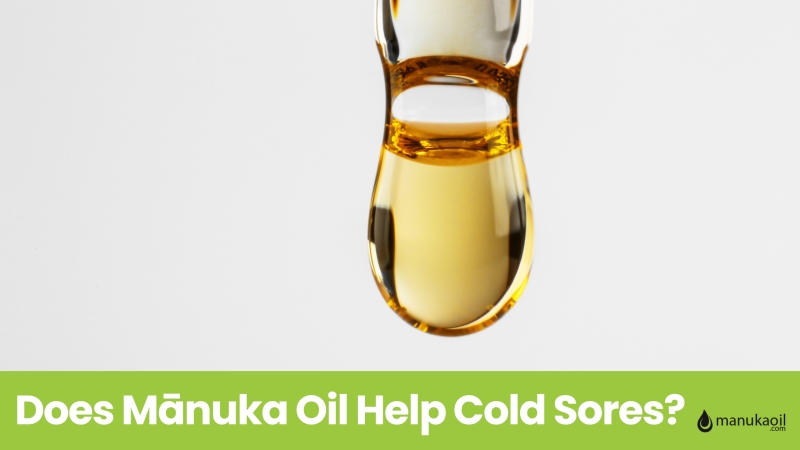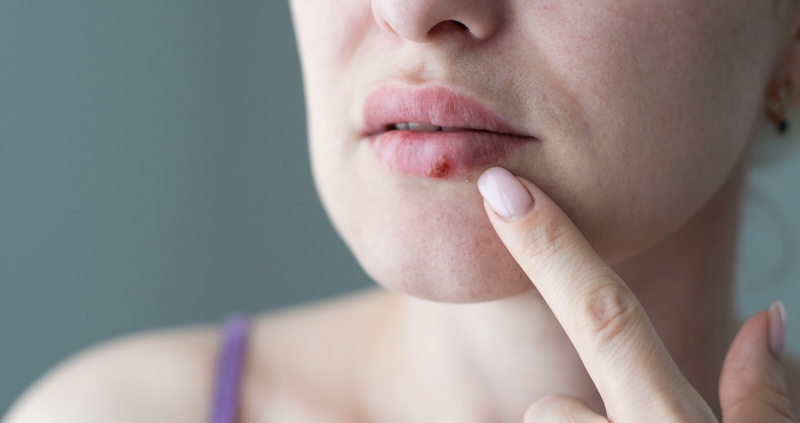Cold sores are contagious and can be uncomfortable and unsightly. Although it is a common viral infection, affected individuals may feel embarrassed about having cold sores. Different factors can trigger this infection, including stress, sun exposure, or a compromised immune system.
While there are various treatments available for cold sores, one natural remedy has gained attention in recent years: mānuka oil.
Mānuka Oil: An Overview
Mānuka oil is a pure essential oil with a clear yellow (or pale yellow) liquid slightly denser than other essential oils.
It is a lesser-known counterpart of its distant cousin, mānuka honey, and both come from the mānuka tree, scientifically known as Leptospermum scoparium. Their difference lies in a number of things, but the easiest way to identify the distinction between mānuka oil and mānuka honey is their extraction process.
Mānuka oil is extracted through the steam distillation of the leaves and branches of the mānuka plant to purify the natural compounds, which are temperature-sensitive. Mānuka honey, on the other hand, is produced by bees feeding on the nectar of mānuka flowers.
Traditionally, mānuka oil has had a long history of use in traditional Māori medicine to cure a myriad of illnesses:
- Tea made from the mānuka leaves served as a remedy for stomach ailments, diarrhea, and urinary tract infections (UTI)
- Mānuka leaves were used to treat fevers, burns, wounds, skin disorders and relieve joint pain
- Vapours from the mānuka leaves were used as an inhalation to treat colds
Today, mānuka oil is an essential oil that has become prominent in the skincare and healthcare industry.
Experts recognise this natural oil for its antibacterial, antimicrobial, antifungal, anti-inflammatory and antiviral properties. Altogether, these properties are responsible for mānuka oil being an effective treatment for many gram-positive and gram-negative bacteria, including the Herpes Simplex Virus (HSV) Type 1 (HSV-1), which causes cold sores.
Mānuka Oil’s Antiviral Properties
In a German study conducted by Reichling, J. et al. (2009), it was found that East Cape mānuka oil, rich in β-triketones, derived from Leptospermum scoparium, exhibits potent antiviral efficacy. This remarkable antiviral activity can be attributed to several key antiviral constituents within the oil. These constituents include β-triketones such as flavesone, leptospermone, iso-leptospermone, and grandiflorone, as well as compounds including β-caryophyllene, selinene, aromadendrene, calamenene, spathulenol, cadinene, elemene, and cubebene.
Moreover, the presence of beta-triketones in mānuka oil has been demonstrated to be highly effective in inhibiting the growth and replication of viruses, including the herpes simplex virus responsible for cold sores.
Effectiveness of East Cape Mānuka Oil Against Cold Sores
A standard measure of antiviral activity is IC 50, the concentration of an antiviral compound required to inhibit infectivity of the given virus by 50%. Low IC 50 values indicate high effectiveness.
Antiviral Activity (IC 50 ) of Mānuka Oil & Other Essential Oils Against HSV-1
| EO (Scientific Name) | HSV-1 |
| Mānuka oil (Leptospermum scoparium) | 0.0001% |
| Sandalwood oil (Santalum album) | 0.0002% |
| Mountain pine oil (Pinus mugo) | 0.0007% |
| Tea tree oil (Melaleuca alternifolia) | 0.0009% |
| Lemon oil (Citrus limon) | 0.0015% |
| Thyme oil (Thymus vulgaris) | 0.001% |
| Peppermint oil (Mentha piperita) | 0.002% |
| Star anise oil (Illicium verum) | 0.004% |
| Cinnamon oil (Cinnamomum verum) | 0.008% |
| Eucalyptus oil (Eucalyptus globulus) | 0.009% |
| Spike lavender oil (Lavandula latifolia) | 1% |
| Rosemary oil (Rosmarinus officinalis) | 1% |
| Marjoram oil (Origanum majorana) | 1% |
What Are Cold Sores?

Cold sores, a prevalent and contagious viral infection, are primarily caused by Herpes Simplex Virus Type 1 (HSV-1). These small, fluid-filled blisters manifest around the lips, frequently appearing in clustered patches. Subsequent to the blister rupture, a scab forms and can persist for several days. In the absence of intervention, cold sores typically necessitate two to three weeks for full recovery.
Moreover, cold sores have the potential to become chronic, with recurrent infections demonstrating resistance to antiviral drugs such as Acyclovir and its derivatives, Foscarnet and Cidofovir. Topical application of these medications may induce inflammation, burning sensations, stinging, itching, rashes, and dry or peeling skin. On the contrary, oral administration of these drugs can result in undesirable and occasionally severe side effects, including headaches, nausea, and renal impairment.
In addition, herpes infections can lead to serious systemic illnesses in immunocompromised individuals and newborns. Consequently, there exists an unmet demand for novel, highly efficacious antiviral treatments that are gentle on the skin and do not exacerbate antiviral resistance.
How Does Mānuka Oil Kill HSV?

According to Reichling et al. (2009), mānuka oil can inactivate HSV (Herpes Simplex Virus) viruses before they enter host cells. This inactivation occurs through mechanisms such as breaking down the viral envelope or masking essential viral components required for adsorption or entry into host cells.
Hence, mānuka oil emerges as a topical treatment for herpes infections, particularly in cases involving frequent recurrences.
Moreover, the prospect of utilising mānuka oil in a lip balm holds significant potential. Even at a minimal concentration of just 0.001%, mānuka oil can be incorporated into lip balm formulations, either with or without synthetic active ingredients, to help reduce the occurrence of cold sores potentially.
Dee-Ann Prather, Managing Director of Down Under Enterprises, when discussing mānuka oil’s role in combating cold sores, remarked that mānuka oil provides formulators with practical advantages at a very low cost per unit.
To put this into perspective, a standard 5ml lip balm product, including this all-natural mānuka oil ingredient, would contribute less than 0.37 cents to the overall formulation cost. These findings present compelling reasons to consider the integration of mānuka oil into both existing and new lip care formulations.
How to Use Mānuka Oil for Cold Sores
Using mānuka oil for treating cold sores is a straightforward process. One can apply a diluted solution of mānuka oil directly to the affected area using a cotton swab or a clean finger. Alternatively, a few drops of Mānuka oil can be mixed with a carrier oil, such as coconut oil, before being applied to the cold sore.
FAQs on Mānuka Oil for Cold Sores
Is mānuka oil safe to use on cold sores?
Mānuka oil is generally safe for topical use, but it is recommended to perform a patch test first.
How long does it take for mānuka oil to show results on cold sores?
Individual responses may vary, but some users report relief within a few days of consistent use.
Are there any known allergies or sensitivities associated with mānuka oil?
While rare, some individuals may be sensitive or allergic to mānuka oil. Perform a patch test and discontinue use if any adverse reactions occur.
Can mānuka oil be used for other skin conditions?
Yes, mānuka oil has various skincare benefits and is effective for conditions like acne and minor skin irritations.
Is mānuka oil suitable for all skin types?
Mānuka oil is generally suitable for most skin types, but individuals with sensitive skin should exercise caution and dilute it with carrier oil if necessary.
Are cold sores contagious?
Yes, cold sores are highly contagious. They can spread through direct contact with an active cold sore or with items that have come into contact with the virus, such as towels or utensils.
Are cold sores an STD?
Cold sores are often caused by the herpes simplex virus type 1 (HSV-1), which is typically not considered a sexually transmitted disease (STD). However, it can be transmitted through intimate contact, including kissing.
Can cold sores spread?
Yes, cold sores can spread to other areas of the face or even to other individuals if proper precautions are not taken. Avoid touching cold sores, practice good hygiene, and refrain from close contact to prevent the spread of the virus.

